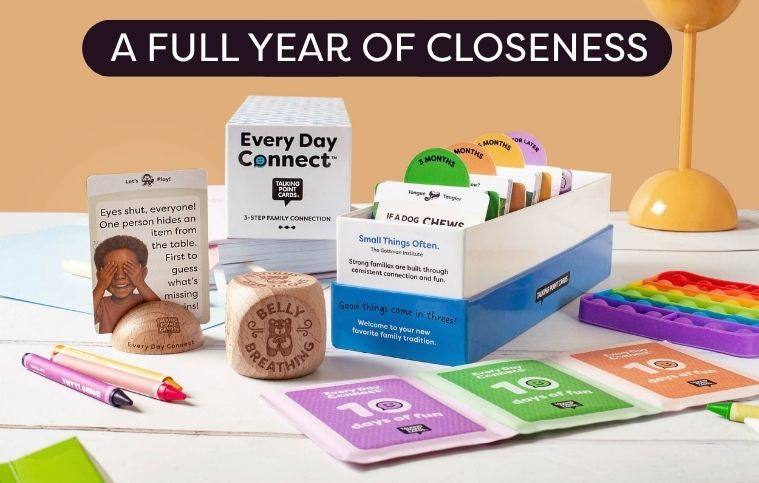SHOP
About
Mastering the Art of Conversation
TEACHING KIDS TO COMMUNICATE EFFECTIVELY

The Awkward Family Silence That Sparked It All
We've all been there—sitting around the dinner table, forks idly pushing food around plates, the crushing silence weighing down on everyone like a soggy wool blanket.
"So...how was school today?"
"Fine."
Cue more silence.
As a kid, I dreaded these moments. My mind would start spinning wildly, searching for something - ANYTHING - to fill the void and spare me from feeling like I might suffocate from the tension. I envied families on TV shows who seemed to converse so naturally and effortlessly. Why did talking have to be so hard?
It was years later, in an interpersonal communications class in college, that I had my first real "Aha!" moment about conversation. I realized good communication is not just some mystical talent - it's an art that can be learned and honed through awareness and practice. And it's arguably one of the most important life skills we can pass on to our kids.
From that point on, I made it my mission to crack the code of connection through conversation. I'm certainly no Steve Martin, but I've picked up enough tips and mindset shifts along the way to at least make small talk far less torturous.
So today, I'm going to share some highlights in hopes that they'll help other families have rich, engaging dialogues around the dinner table.

Why Good Conversation Matters for Kids
Before we dive into the nuts and bolts, let's take a step back - why is this endeavor even important? What's the big deal about conversation skills anyway? A few key reasons:
Kids need practice conversing before high-stakes situations. As kids get older, the ability to clearly express thoughts and articulate ideas becomes crucial - for school presentations, job interviews, networking events, you name it. Adulthood is basically one big conversation gauntlet, so the more low-stakes practice kids get in the safety of their families, the better.
Good communication fosters closeness and understanding. Ever had a friendship or relationship unravel due to poor communication? It's painful. Conversation is the bridge that allows us to share experiences, confide fears and dreams, and truly know one another on a deeper level. Strong communication = strong bonds.
Conversation skills are practical life skills. Whether they grow up to be an entrepreneur pitching investors or a service worker dealing with customers, almost every job requires some ability to communicate effectively. And in our increasingly automated world, skills rooted in interpersonal interaction will be more vital than ever.
Kids mimic the conversation habits they see at home. For better or worse, many of our conversation habits - the filler words we use, our tendencies to interrupt or not make eye contact, etc. - are directly shaped by the examples set in our childhood homes. By intentionally creating a conversational culture in your family, you're giving kids the priceless gift of a positive model.

Creating an environment conducive to good conversation is the crucial first step, and it starts well before you actually open your mouth.
Warming Up: Setting the Stage for Conversation
Minimize distractions.
In today's device-filled world, we're constantly tempted by a million different shiny objects vying for our attention. But good conversation requires being fully present. It sounds obvious, but simply setting technology aside and minimizing other distractions in your conversation environment can work wonders.
Get comfortable.
There's a reason "Let's have a bonfire!" is code for "Deep talk time!" Pretty much anywear you can get cozy will make people feel more at ease to let their guards down and share more freely. I'm not saying you need to buy a nest of beanbags for your living room (though I do love me a good beanbag), but finding a relaxing setting puts everyone in a better frame of mind.
Ease into it.
In many ways, [good conversation is a bit of a performance] - one that requires warming up. Don't be afraid to do some light conversational stretching by chatting about more low-stakes topics (the weather, for example 😆) before easing into deeper subjects. Trust that deeper grooves will form natrualy as you all loosen up.
Conversational Mindsets That Make a Difference
Once you've set the stage, a huge part of mastering conversation is simply being intentional about the mindsets and attitudes you bring to it:
Be curious, not a conversational narcissist. A common bit of feedback I hear about bad conversationalists is "They're just waiting for you to stop talking so they can talk about themselves again!" Translation: They aren't actually listening - they're just waiting for their next chance to monologue. Good conversationalists are intensely curious andande to learn about the other person by asking follow-up questions and steering the talk in a natural way.
Self-awareness is key. Another door to more engaging conversations is being aware of your own unconscious speech habits and tendencies. Do you say "umm" and "like" constantly? Interrupt often? Drift off and start zoning out when someone else is speaking? Just being mindful of those habits can help you start correcting them.
Ditch the questioning. Did you ever have a teacher whose "lesson" was just them grilling you on topics none of you had context for yet? raises hand While questions are an important part of keeping a conversation flowing, a rapid-fire Q&A dynamic can quickly backfire and make the other person feel defensive. Go for a balance of questions and organic back-and-forth dialogue for best results.
Keep it light and fun! Too often conversations become these heavy, dreary affairs where everyone just goes into venting mode. And while there's certainly a time and place for more serious talk, some of the best conversations are filled with humor, laughter, witty exchanges, and moments of genuine lightness. Don't be afraid to be playful! I'd say about 70% of my conversations now somehow involve puns, wisegracks, or goofy hypotheticals because those are the convos I have the most fun with.
Once you've got the right mindsets and setting down pat, good conversation then comes down to striking a balance among five key elements:

1) The Opener
Getting a conversation rolling requires what I like to call an "Opener" - some kind of prompt, question, musing, or statement that gets the mental wheels turning. Good conversation openers tend to be open-ended, play to the specific audience, draw upon interesting topics both parties have at least some knowledge on, and aim to solicit more than just a one-word response.
2) Listening
It may be obvious, but listening is mission critical in conversation. Not just hearing words, but listening with the intent to understand the subtext of what someone is expressing. Too often we spend half the conversation planning what we're going to say next in our heads. True listening entails maintaining eye contact, being present, and allowing for pauses/silence rather than rushing to fill every gap with your own voice.
Pro tip: Try occasionally repeating back key points someone shared to show you were fully tracking what they said.
3) The Back and Forth
Think of conversation like a rally in tennis—it requires smoothly returning and receiving info back and forth. But many conversations start to feel more like throwing a ball against a wall, with one side clumsily dominating the discourse. Good conversationalists weave in questions, keep things balanced, read social cues, and avoid getting too long-winded before allowing the other person ample opportunity to rejoin the volley.
4) Engaging the Imagination
Good talkers understand how to make abstract ideas come alive through rich, evocative language and creative examples/analogies/metaphors. If you really want to captivate someone, practice painting pictures in their mind rather than just exchanging bland factual statements. Some of my favorite conversationalists are people who tell lots of anecdotes and personal stories in a vivid, theatrical way. It engages both the intellectual and creative sides of your brain.
Note: It's worth practicing your storytelling skills by trying to hit all the classic beats: descriptive scene setting, cliffhangers, embellished characters, snappy dialogue, dramatic pacing, etc.
5) Building Upon Ideas
In many respects, the flow of great conversation mirrors the creative process itself. The best ones feel collaborative, where new ideas and pathways branch off naturally from what was said before. Good conversationalists practice the art of "yes, and..." thinking - where they take the momentum and nuggets of insight from previous statements and then build upon them in an additive, complementary way. It's a constant game of rhetorical call and response that leaves both parties feeling energized and like their ideas have been expanded.
Pro tip: If you ever feel a conversation stalling out, simply looking for a new tangential angle to riff on can often revive it. The goal is to keep the idea bouncing and evolving.

Beyond simply being mindful of good conversation dynamics, another key area to focus on is creating intentional rituals and activities for practicing the art regularly as a family.
Creating Conversation Rituals and Games
Having a dependable time and place for bonding over conversation can work wonders. Some fun ideas to try out:
Dinnertime Discussions
Make a ritual out of having an engaging discussion question or conversational game added to the menu each night. Take turns letting each person play question master and surprise the family with a new prompt for everyone to ruminate on over the meal. Old philosophy brain teasers and icebreakers can be a rich vein for mining prompts.
Nights of Narrative
Taking a page from The Moth and other storytelling events, devote one night a week to having each family member tell a 5-10 minute personal story from their life - with plenty of built-in breaks for follow up questions and embellishments from the crowd. This helps build essential skills like persona and plot development, character rendering, and learning to read an audience.
Podcasting the Family
For a fun long-term project, consider starting a silly family podcast! Having a "show" you produce together gives you a natural excuse to interview each other regularly and generate all kinds of material. You could do sketch comedy, fantastical storytelling, book reviews - whatever format fits your fam's vibe. Just the process of collaborating and constantly coming up with new episode arcs will force you all to practice conversational agility.
Weekly Word Games
For a simple, no-prep way to get conversation flowing through play, stock up on a supply of mad libs, listicle word games, verbal rubix cube-style prompts, and other language-based group activities for a weekly game night. These tend to work best capping off any given week's efforts after you've already put in some conversational reps.
Overcoming Obstacles Like Shyness, Age Differences, and Sibling Tensions
Of course, none of this is to imply that teaching good communication habits is easy—depending on each family's unique circumstances, you may face a minefield of potential obstacles. For example:
Shyness & Introversion
If you have more timid or introverted kids, the prospect of being put on the spot conversationally can cause major anxiety. The key is providing plenty of baby steps while avoiding forcing interaction beyond their comfort zone. Let naturally quieter kids warm up at their pace by allowing them to initiate when ready—or let them opt out of certain activities at first while still observing. The goal is fostering a no-pressure atmosphere.
Age & Development Differences
With varied ages often come vastly different attention spans, humor sensibilities, and general what-the-heck-are-you-talking-about comprehension levels across kids. It may require getting a bit animalistic with high energy for the young'uns, then shifting gears into more abstract territory for the older kids. Let them take turns leading the dynamic they prefer.
Sibling Tensions
Longtime interpersonal beefs and rivalry can make neutral conversation feel like hostile territory for siblings. If there's a lasting dynamic of conflict, it may require some peacemaking and norm resetting before headway can be made. Consider family mediation and rules around making the conversational space a politics/fighting-free zone to start fresh and rebuild.
Strong Personality Differences
From loud talkers to quiet listeners, analytical overexplainers to big understaters, contrasting personality types can generate their own special combustions. Work on having translations for different communication styles and a spirit of mutual understanding. Validate how people experience things subjectively while seeking common ground. With time and practice, you'll find a harmonious balance unique to your family's mix.

The Bottom Line: Conversation is an Investment That Keeps Paying Dividends
At the end of the day, making the effort to build communication muscles as a family is one of the most valuable gifts you can give your kids. Not only will it lead to richer relationships, deeper mutual understanding, and a more satisfying home life in the present. You'll be equipping them with core interpersonal skills that will quite literally pay dividends for the rest of their lives.
So embrace the awkward silences! See them as opportunities rather than pains to avoid. Use them as a launchpad to get creative and turn your family into a troupe of conversational adventurers.
Just think—a year or two from now, your nights around the dinner table could feel more like you're at an intimate comedy show or lively London pub, where inspired exchanges and colorful anecdotes flow as freely as ale. All it takes is an intentional investment in each other and the belief that legendary conversationalists are indeed made through diligent practice, even at a young age.
I don't know about you, but to me that's a future worth talking about.
LIKED THIS ARTICLE?
SIGN UP FOR MORE!






